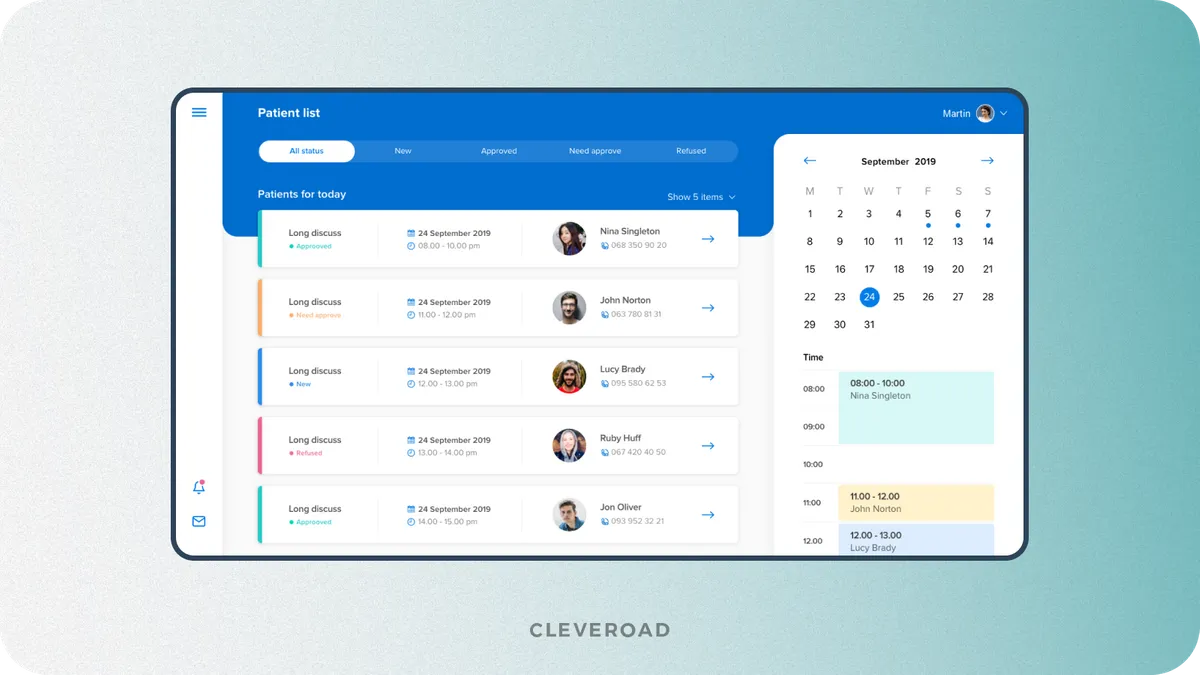Healthcare CRM Development: Types, Key Features, Creation Lifecycle
Updated 03 Dec 2025
17 Min
1488 Views
Healthcare CRM software development allows medical organizations to boost overall performance by creating measurable relationships between all the parties involved: patients, team members, referrals, and providers. Custom healthcare CRM helps in cost reduction, optimized medical services, and enhanced client experience.
At Cleveroad, we know how to make clinical workflows run smoother with custom CRM solutions. With over 13 years of hands-on experience in healthcare software, we build CRM systems that fit our clients' specific business goals and deliver real results. Our post will guide you through the specificities of CRM software development for healthcare, highlighting its key benefits, features, and challenges to cope with. You’ll also learn why creating medical CRM from scratch is a long-run investment.
What Is Healthcare CRM Software
Healthcare CRM solution is a digital tool that helps medical organizations handle patient relationships, simplify both clinical and administrative tasks, and make care more personalized. CRM system keeps all the patient information in one place, automates scheduling, makes tracking medical history easier, and helps staff work more efficiently, which keeps patients satisfied overall.
At its core, CRM software development for healthcare is all about creating custom solutions that fit the industry’s unique operations, rules, and ways of connecting with patients.
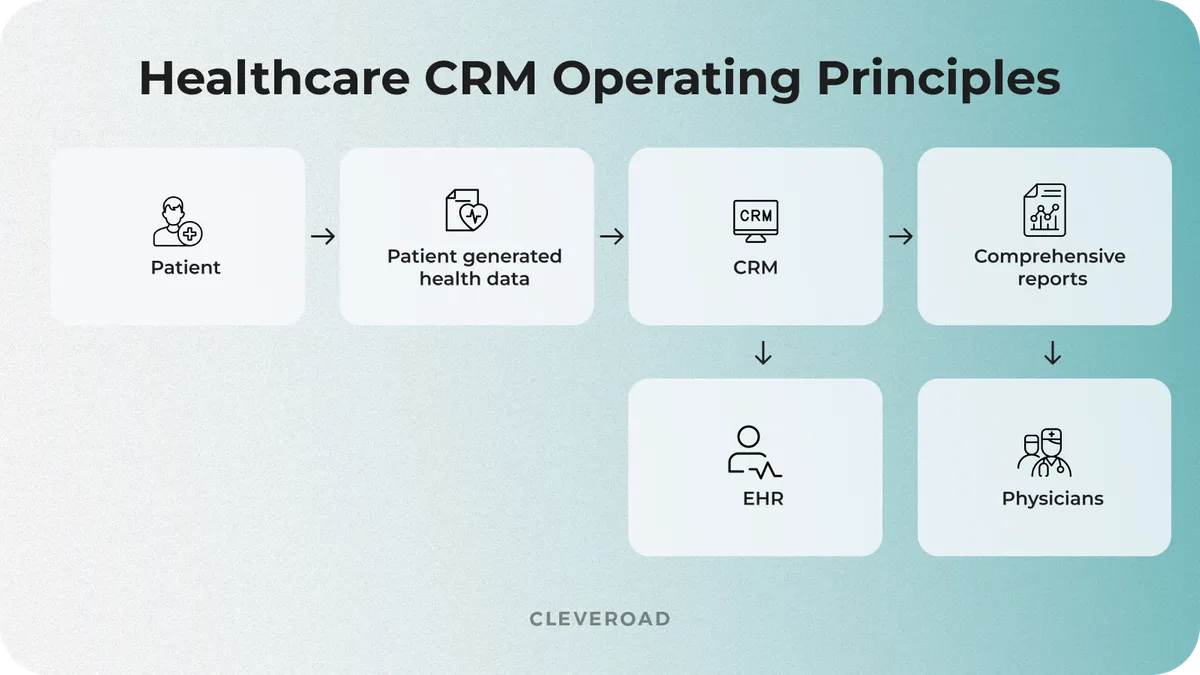
Essence of Custom Relationship Management healthcare system's work
Besides improving day-to-day operations, healthcare CRM systems also analyze patient information, including demographics, medical history, insurance payments, and social factors, to provide insights. These insights help providers develop patient-focused growth plans, tailor treatments more effectively, and foster stronger, longer-lasting relationships by engaging with patients in ways that align with their communication style.
To hit business goals and stay within industry rules, healthcare CRM systems need to cover a range of tech requirements like:
- Work smoothly across different platforms for patients, providers, insurers, and suppliers.
- Sync up with EHRs, patient portals, call centers, chats, and subscription services.
- Fully comply with healthcare regulations like HIPAA and PIPEDA.
- Offer a user-friendly, customizable interface that fits how each organization operates.
Types of healthcare CRM
We enlist below the major types of healthcare CRM software playing a crucial role in enhancing patient care, streamlining administrative processes, and improving overall healthcare management.
Patient Relationship Management CRM focuses on enhancing interactions between healthcare providers and patients. It helps in managing patient communication, appointments, and engagement in cooperation with physicians.
Analytics healthcare CRM works for leveraging data to improve decision-making and healthcare outcomes. Analytical CRM systems integrate data from various sources, including electronic health records (EHRs), to provide insights into patient populations, treatment efficacy, and resource utilization.
Referral Management type of CRM is designed to streamline and optimize the referral process within healthcare networks. These systems assist healthcare providers in accomplishing successful healthcare operations, efficiently managing and tracking patient referrals, ensuring seamless communication between referring and receiving physicians.
Clinical custom healthcare CRM must be specifically designed to support healthcare professionals in managing and organizing clinical workflows. These systems are often integrated with Electronic Health Records (EHRs) during the healthcare CRM development and assist in tasks such as care coordination, documentation, and treatment planning.
Even though healthcare CRM systems are built to handle the specific needs of medical organizations, the main goal of any CRM stays the same: strengthening customer relationships and managing every interaction along the way. Like Marc Ostrofsky puts it:
Marc Ostrofsky
American entrepreneur, venture capitalist
Corporations invest in sophisticated CRM, or Customer Relationship Management, programs to effectively oversee their relationship with customers at every point during the buying process.
What healthcare CRM do
Let's talk more profoundly about the healthcare CRM's common functions to help the administrators and physicians comprehend patients better and satisfy the needs of healthcare facilities, increasing the effectiveness of the rendered medical services.
A healthcare CRM software development provides health organizations with the advantage of understanding their customers better. With this purpose, healthcare CRM tools can analyze data and identify different patterns related to patients, including sincerity, regularity, no-show rates, physician referrals, and the effectiveness of outreach channels. This information can be helpful for doctors to enhance their interactions with every patient, leading to improved care.
The health of high-risk patients could be greatly affected if a timely scan or blood test is delayed by a few months. To prevent this, hospitals use a healthcare CRM implementation in their processes to schedule automatic reminders for timely appointments. These reminders are sent through emails, phone calls, and text messages. Once patient details are entered into the system by hospital staff, the software platform takes care of managing them.
A medical CRM platform helps healthcare providers gather feedback from patients to understand their experiences. This feedback can enhance services and improve the patient experience for doctors and administrators. A healthcare CRM automates the process of sending and collecting feedback.
Healthcare CRM Features to Implement
The right functionality enables healthcare providers not only to automate routine tasks but also to personalize patient care, comply with regulations, and make informed decisions based on data. When implemented correctly, these features transform the CRM into a powerful tool for enhancing both patient care and business outcomes.
Let’s discuss the core functionality of healthcare CRM that you should integrate to benefit from it.
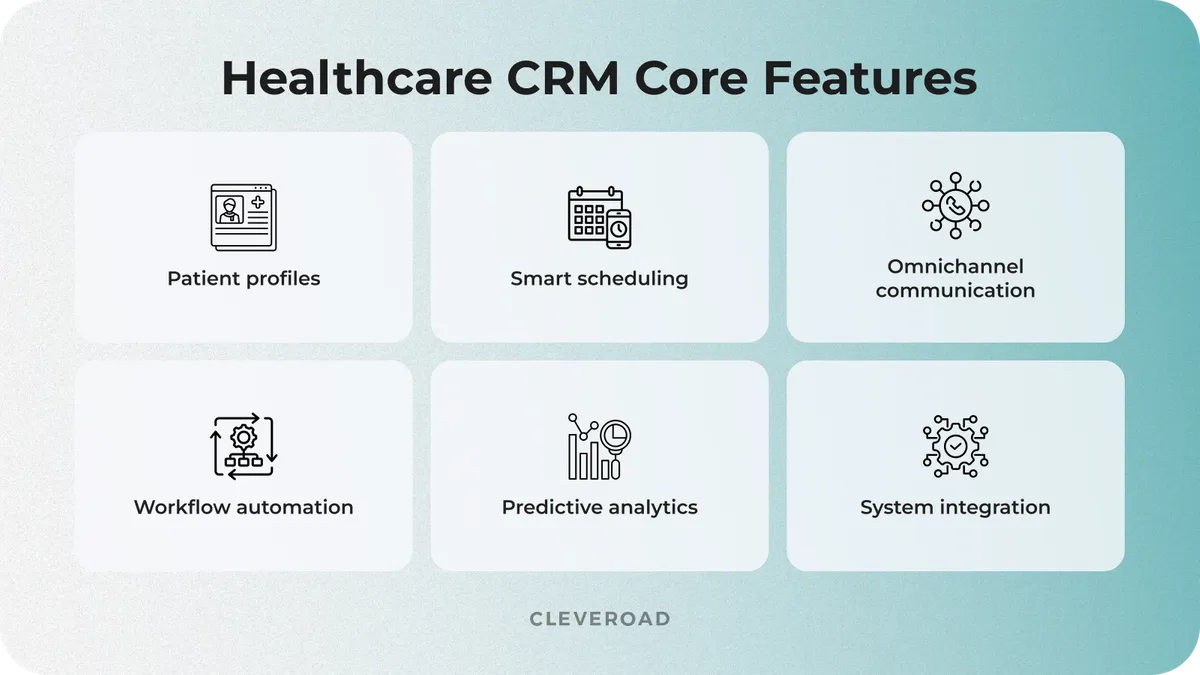
Healthcare CRM development: core functionality
Comprehensive patient profile management
This healthcare CRM software development functionality helps organize and store patient demographics, medical histories, and contact information in a centralized database. The 360-degree patient profiles streamline administrative tasks, such as patient registration and record retrieval, and ensure that healthcare providers have easy access to all the essential patient data during appointments and consultations.
Smart appointment scheduling
The capabilities of appointment scheduling functionality powered by AI recommendations enable healthcare facilities to efficiently manage patient appointments, allocate resources, and minimize scheduling conflicts. Advanced scheduling features may include automated appointment reminders, waitlist management, and the ability to sync appointments with provider calendars.
Omnichannel patient communication tools
Omnichannel communication healthcare CRM development functionality facilitates secure and efficient communication between patients, healthcare providers, and staff members. The HIPAA-compliant omnichannel communication may include secure messaging platforms, telehealth capabilities, and patient portals that allow individuals to access their medical records, request appointments, and communicate with their healthcare team. By enabling seamless communication, healthcare CRM systems enhance patient engagement, improve care coordination, and foster stronger patient-provider relationships.
Task management
Task management helps healthcare teams stay organized and on track by assigning, prioritizing, and tracking tasks related to patient care, administrative duties, and follow-up activities. Task management features implemented during medical CRM software development may include deadline reminders, task delegation, and progress tracking, ensuring that no critical tasks fall through the cracks and that patient care remains a top priority.
Predictive analytics and real-time reporting tools
Advanced analytical tools empower healthcare organizations to leverage data insights for strategic decision-making, performance monitoring, and quality improvement initiatives. Predictive algorithms can find out possible readmissions, spot high-risk patients, or enable smart and proactive decision-making on both the clinical and business side. By providing actionable insights, analytics and reporting functionalities enable healthcare providers to identify areas for improvement, optimize workflows, and enhance the overall quality of care delivered to patients.
Integration capabilities
They are essential for seamlessly connecting healthcare CRM systems with other existing software applications, such as performing healthcare EMR integration, billing systems, and third-party tools implementation. Integration features ensure interoperability, data exchange, and consistency across different platforms, allowing for a more comprehensive healthcare management ecosystem.
Discover in our guide how your integration capabilities would influence the custom CRM development cost
6 Steps to Healthcare CRM Software Development for Your Business
CRM software development for healthcare can be performed in many directions. We’ll describe the traditional Agile model in SDLC to build such a digital solution.
Step 1. Hiring technical partner
The first and most important step in CRM software development is finding a solid tech partner with real experience in healthcare software development services. Since you're dealing with tricky stuff like regulatory compliance, data security, and patient engagement, it’s key to team up with a vendor who knows healthcare software inside and out to help your project meet standards like HIPAA, PIPEDA, etc.
When you're checking out vendors, look at their healthcare projects, see what they've successfully delivered, make sure they know their tech stack, and read verified client reviews on sites like Clutch. With over 13 years of hands-on experience in healthcare software development, Cleveroad builds HIPAA-compliant solutions that fit the needs of medical organizations.
You can check out Cleveroad’s Clutch profile to read customer feedback and see the healthcare CRM projects we’ve completed.
Picking a software development partner with healthcare expertise ensures your CRM supports clinical goals while staying fully compliant with industry regulations.
We’ve got many satisfied customers from the Healthcare industry. One of them is Prime Path Medtech, a medical device manufacturer that needed a fully automated Quality Management System (QMS) to cover documentation flow and their processes. Our team has created a flexible Quality Management System (QMS) with architecture modules that consider the business context and comply with FDA and ISO requirements.
Here is what Breanne Butler, Client Liaison Officer at Prime Path Medtech™, says about cooperation with Cleveroad:
Breanne Butler, Client Liaison Officer at Prime Path Medtech™
Step 2. Making sure the vendor brings a full team
CRM software development for healthcare isn’t like putting together your usual business app. Having all the complicated medical workflows, sensitive patient data, and strict industry rules, you need a full-scale health CRM development team to put your software building idea right.
A solid healthcare CRM team usually includes:
- Backend engineers setting up scalable cloud or on-prem systems, making sure data stays safe and the system runs smoothly.
- Frontend developers building easy-to-use web and mobile apps for patients, medical staff, and admin teams.
- UI/UX designers focusing on user-friendly designs that make navigating complex healthcare data user-friendly.
- Quality Assurance engineers testing everything carefully to catch bugs and making sure the system works well on all devices.
- Project managers handling schedules, and keeping everyone in sync.
- Business analysts diving deep into healthcare processes, turning business needs into detailed tech requirements, and help define the project’s scope.
- Solution architect mapping out the whole system, picks the right tech, makes sure everything connects smoothly with third-party tools, and ensures the CRM stays compliant with healthcare rules while being ready to scale.
Cleveroad’s healthcare team comprises over 250 engineers, with 75% holding senior and middle-level positions. Our experts blend technical skills with domain know-how to cover every piece of CRM development, from solid backend setups to patient-friendly designs, making sure your final product fully supports your organization’s needs.
Step 3. Project requirements analysis
Software Development Lifecycle (SDLC) at Cleveroad begins with a Solution Design Workshop, which is free of charge. This is a focused consulting session where our Solution Architect and business analysts team up with your stakeholders to dig into business goals, shape the system vision, map out key features, and spot any potential tech hurdles right from the start.
Then, we move into the Discovery Phase services. The BA team takes a deeper dive into your product idea, looking closely at your business objectives, target audience, and market plans. They put together a detailed spec covering functional scope, security needs, third-party integrations, tech stack, and compliance factors for building healthcare CRM software. Our Discovery process designed to fit your organization's goals and daily operations perfectly.
At this point, our Solution Architects map out the software architecture based on your exact non-functional needs. A lot of times, we suggest going with a cloud-based setup since it’s scalable, always available, and easily connects with different healthcare data sources: all must-haves for today’s CRM systems. As an AWS Select Tier Partner, we build the solution to be solid and secure by using trusted AWS frameworks and healthcare-focused tools like Amazon HealthLake, AWS FHIR Works, and HIPAA-compliant cloud services.
Step 4. UI/UX design and prototyping
The design team defines critical user scenarios (e.g., patient segmentation, reporting) and visualizes the main functionality. To streamline the user journey inside the system, our design team sticks to the following rules:
- Picturing the user journey from the point of “end-user”. Designers analyze the preferences and logic of the end-users and make interfaces based on them.
- Reducing the number of actions required to accomplish the task. We try to cluster the functions to make associated actions reachable in one click. This enables the elimination of redundant elements and facilitates “user-CRM” interactions.
- Displaying critical information at the start of the user journey. Healthcare providers frequently open CRM to review the appointment schedule or lab results. To optimize the user journey, the essential information is located on the main screen for quicker access.
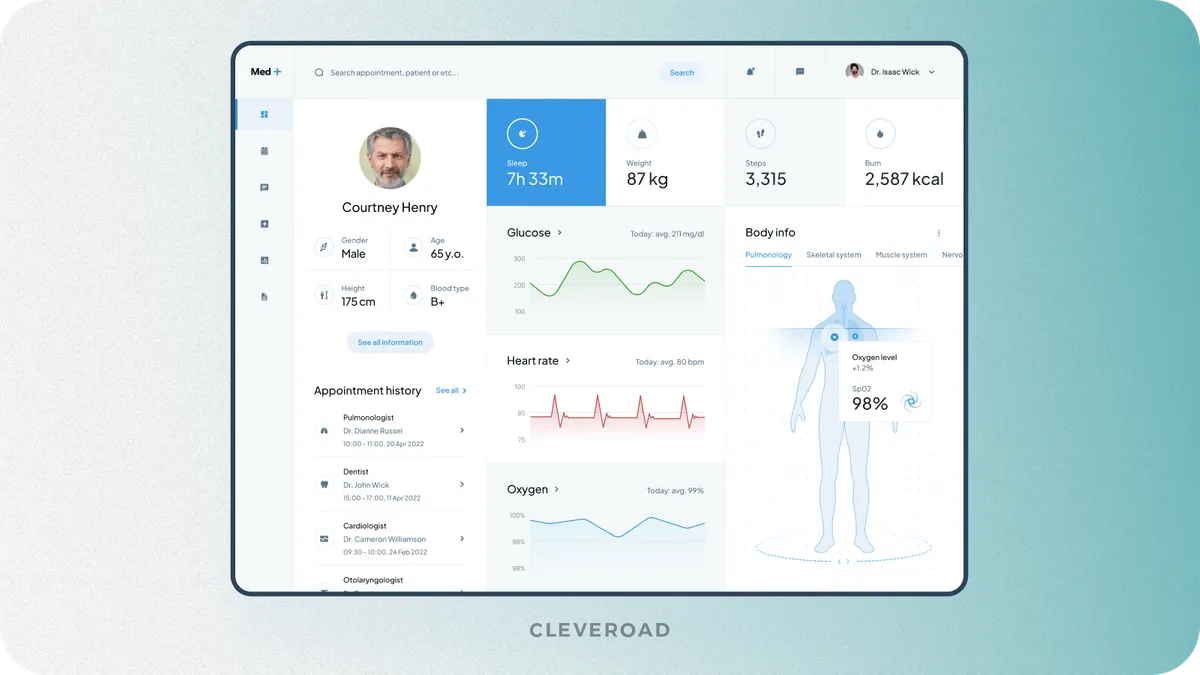
Healthcare CRM for doctors designed by Cleveroad team (source: Dribbble)
Step 5. Development, integrations, and testing
It’s the most responsible and challenging part of healthcare CRM development. During this stage, the software engineers build a backend and frontend of your CRM platform and integrate APIs to facilitate data sharing with third-party apps. After the custom healthcare CRM development is finished, it should be interconnected with other business solutions to cover all business operations and scale profit through systems' synergies.
Testing experts execute multiple manual and automated tests to check the health CRM functional requirements and mitigate the functioning flaw. This stage also intends to evaluate whether your system is ready for deployment and complies with core security and legislative norms. Before the final client review, the team verifies all the functionality (including integrations, usability, and security) to ensure the healthcare CRM performs as expected and meets project requirements.
Step 6. Launch and maintenance
Once all previous healthcare CRM software development stages have passed, it's time to deliver your solution to the end customers and stakeholders for testing and feedback. Then, based on collected information, you make modifications if needed. CRM systems for healthcare may require multi-tier support due to their complexity. Therefore, it’s better to continue cooperation to create value in the long term. Moreover, system security and standards compliance have to be verified regularly.
Take advantage of our CRM development services while planning its development for your facility
Key Pitfalls of Healthcare CRM Development
Medical CRM development isn't fundamentally differ from any other digital system's creation. However, it has some specialties related to regulatory compliance and data protection arising particularly in the healthcare industry.
Navigating evolving compliance issues
Since medical CRM software development processes and stores vast amounts of sensitive patient data, they must be compliant with strict medical regulations, such as HIPAA. The list of laws will differ from county to county and project specificity.
That's why, before initiating your own CRM project for healthcare, conduct research to know what industry standards you must adhere to. By the way, Cleveroad’s healthcare experts guide clients through tricky regulations, making sure CRM solutions meet HIPAA, PIPEDA, HITECH, FDA, CDA, and other industry standards right from the start.
Patient data protection
Healthcare cybersecurity has become one of the leading issues in the healthcare industry. That's why it's critical to consider at least basic security measures to secure electronic Patient Healthcare Information (ePHI):
- Personnel training. Professional training is critical to prepare the workforce for possible malicious actions. It includes identifying phishing emails, creating regular data backups, using strong passwords, etc.
- Data access safeguards. Medical organizations should control and trace suspicious activity in the system. It’s recommended to incorporate systems that block unauthorized access to data, avoid exchanging of unauthorized emails, prevent data from being copied, etc. It is also good to employ advanced technology, such as blockchain, for data encryption during transferring and storage.
- Tracking of mobile and portable devices. Mobile phones, apps, and IoMT devices are widely applied for remote patient monitoring. To safeguard mobile data and IoT networks, you should consider multi-layered authentication, remote blocking of lost/stolen smartphones as well as healthcare legacy systems modernization (including safety apps and medical sensor control systems.
Getting ISO certification
ISO standards in healthcare are about guaranteeing patients have access to high-quality medical services as is needed. By incorporating ISO standards, you assume obligations to quality, transparency, safety, and accountability rules. These standards make it easier to address challenging and ever-evolving requirements of data security. The set of ISO standards varies from quality (ISO 9001), environmental (ISO 14001), and energy management (ISO 50001) to information security (ISO/IEC 27001).
Achieving ISO Certification became more accessible thanks to today’s modernized systems. To become ISO certified, you need to go through the basic steps:
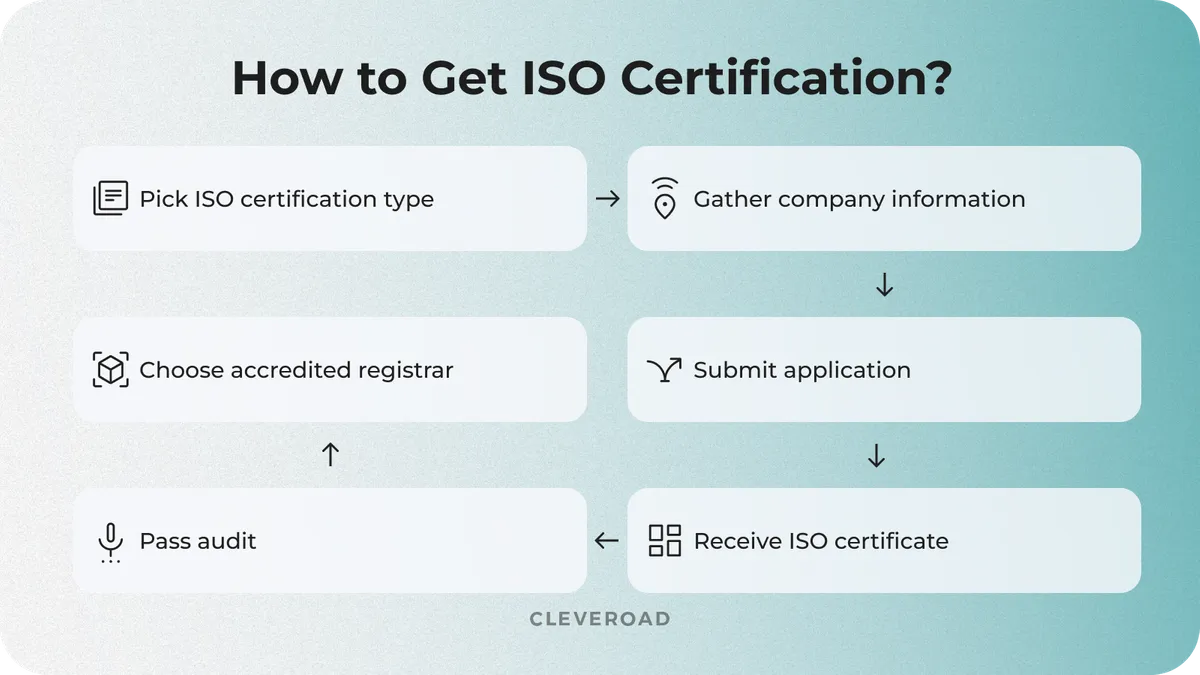
Major steps to get ISO certification for your healthcare CRM
Establishing systems interconnection
According to ScienceDirect, CRM in healthcare produces valuable insight by analyzing data obtained from numerous resources. That’s why it should be integrated with other medical management systems and tools, such as:
- Electronic Health Records (EHR)
- Electronic Medical Records (EMRs)
- Quality Management System (QMS)
- Radiology Information Systems (RIS)
- Patient portals
The software should also be consolidated with medical billing, accounting, human resources management (HRM), and other back-office systems. Moreover, it is important to use the benefits of medical device integration with healthcare CRM after it's built. Merging different types of software enables records consolidation and consistency. Cleveroad helps healthcare providers build CRM systems that easily connect with EHRs, billing platforms, patient portals, and medical devices, all while staying fully compliant and making sure everything works together smoothly.
Integrating APIs
Healthcare APIs play a big role in making devices work smoothly together. With APIs, healthcare providers can easily share patient records across different systems and pull everything into one place. This makes it easier to coordinate patient care between everyone involved.
But adding these APIs can increase the CRM development cost, since every new connection makes the system more complex and needs careful setup, testing, and security checks. From what we’ve seen, the key APIs for healthcare CRM development are: Registration API, Scheduling API, Financial API, and Hospital Management API.
As you can see, there are some specificities in initiating digital healthcare solutions. However, relying on Cleveroad’s experience in healthcare software development, you’ll be ensured in handling all the issues concerning healthcare CRM software development.
Benefits of CRM Software Development for Healthcare
Healthcare organizations turn to CRM solutions to get a better handle on patient care and make daily operations run more smoothly. Let’s break down why healthcare CRM software development is a smart long-term move.
Cutting down on medical errors
CRM for healthcare pulls together patient records in one place, giving doctors quick access to full medical histories, test results, and treatment plans. This CRM functionality helps avoid mistakes caused by missing info, hard-to-read handwriting, or communication slip-ups, which leads to fewer medical errors and better decisions.
Keeping sensitive data safe
Healthcare customer relationship management systems use strong encryption, strict access controls, and audit trails to keep patient data secure. By following HIPAA and other regulations and standards, they ensure data stays protected, building trust with both healthcare providers and patients.
Enhancing the patient experience
With personalized care and better communication, healthcare CRMs let patients take charge of their health. Features like appointment reminders, patient portals, and secure messaging build trust, boost satisfaction, and help patients stick to their care plans.
Managing patient data more efficiently
Good data management brings together electronic health records, diagnostic results, and treatment info in one system. This clear, complete view helps providers make smarter decisions, keep care teams on the same page, and break down data silos across the board.
Why Choose Cleveroad for Healthcare CRM Software Development
Cleveroad is an outsourcing healthcare software development tech partner with proven expertise in delivering custom digital solutions for the medical business and/or modernizing the existing medical systems. With long experience in healthcare custom software development (since 2011), our team offers full-cycle IT services for medical organizations that automate business workflow, facilitate data transmission, and improve patient care delivery.
Being an ISO-certified IT vendor and passing certifications for ISO 27001:2013 (security) and ISO 9001:2015 (quality) Standards, Cleveroad is ready to help you develop a secure and top-notch healthcare CRM system for better care coordination in your medical facility.
By collaborating with us, you’ll get:
- Hands-on experience building complex multimodular healthcare solutions, such as EHR, EMR, eRx, patient portals, remote patient monitoring apps, etc.
- Building telemedicine software solutions that comply with HIPAA, HITECH, PIPEDA, GDPR, and other domain regulations
- Conducting healthcare CRM development and delivering medical CRM systems along with industry regulatory standards, such as ISO and FDA regulatory requirements
- Ability to deliver compliance-ready healthcare software for GDPR, HIPAA, FDA, etc.
- On-demand services: software modernization services, cloud migration, IoT software engineering, blockchain integration IT services, etc.
- A thorough consultation with our Healthcare Subject Matter IT experts regarding the healthcare CRM system development and integration
- Signing Non-Disclosure Agreements (NDA) as requested
Let us prove our competence in delivering telehealth projects by introducing our latest NDA case: Telemedicine appointment management system. The core idea behind this project is to build a robotized medical system for remotely providing 24/7 access to health-related services.
Our client received a solution suited to the specific business needs enabling users to schedule medical appointments online. The platform incorporates RBAC access to the systems for physicians, customers, and admins to provide fitting opportunities for each party involved. In addition, the platform is fully compliant with the relevant legislation. The output of our client is a custom SaaS-based platform that increases performance by automating the care delivery process and patients.
Build a health CRM with domain experts
Having practical experience in creating complex healthcare systems, our domain experts will guide you on medical CRM development to address the needs of your medical facility
CRM in healthcare is a digital solution for healthcare providers to make patient interactions, care coordination, and admin tasks run more smoothly. The healthcare CRM market keeps growing as software helps improve patient data management, giving quicker access to full medical histories and making personalized care easier. Working with an experienced software development company is key to building custom CRM platforms that tackle challenges among healthcare organizations.
The CRM strategy for healthcare involves implementing a comprehensive approach to managing patient relationships, improving communication, and enhancing the overall patient experience. It includes utilizing CRM software to centralize patient data, streamline administrative processes, and personalize patient interactions. The strategy focuses on fostering strong patient-provider relationships, optimizing care delivery, and leveraging data insights to continuously improve healthcare outcomes and satisfaction.
Medical CRM software is a healthcare CRM platform that helps manage patient relationships, smooth out workflows, and boost coordination among healthcare teams. Unlike a common healthcare CRM that covers just the basics, CRM software for healthcare developed through custom healthcare software development is tailored to fit specific clinical needs and meet regulatory standards. It also works seamlessly with existing healthcare systems, giving the whole organization a single, unified view of patient data.
Customer Relationship Management (CRM) system in software development refers to a platform designed to manage interactions and relationships with customers or clients. It typically involves the use of technology to organize, automate, and synchronize sales, marketing, customer service, and support processes. CRM software enables businesses to centralize customer data, track customer interactions, analyze customer behavior, and ultimately improve customer satisfaction and retention.

Evgeniy Altynpara is a CTO and member of the Forbes Councils’ community of tech professionals. He is an expert in software development and technological entrepreneurship and has 10+years of experience in digital transformation consulting in Healthcare, FinTech, Supply Chain and Logistics
Give us your impressions about this article
Give us your impressions about this article

